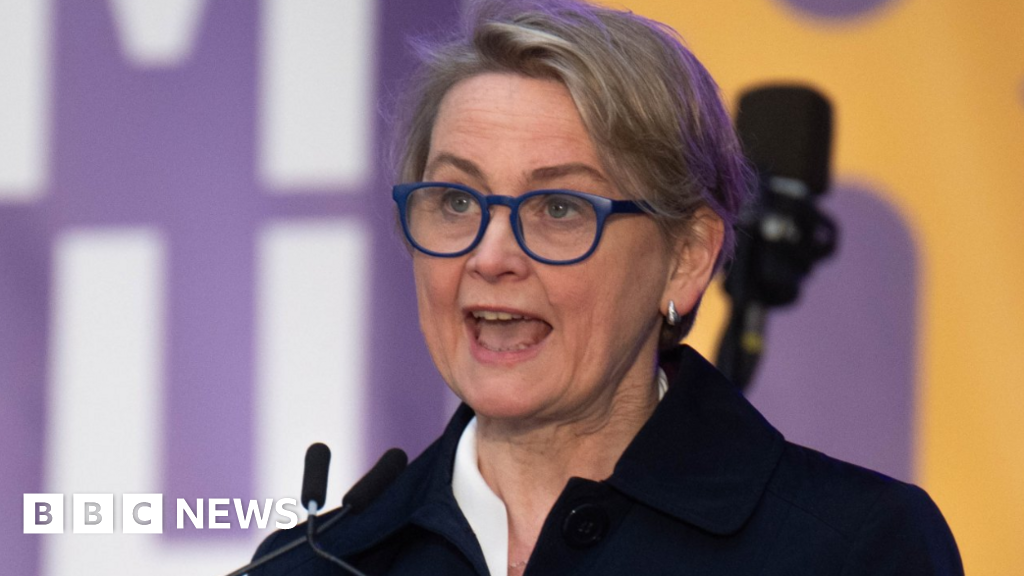ARTICLE AD BOX
By Enda McClafferty
BBC News NI political editor
The debate was held in front of an audience at the BBC in Belfast
Trailing from the first leg of the TV debate and falling further behind in the polls, Democratic Unionist Party leader Sir Jeffrey Donaldson needed a big performance.
He knew how his opponents would line up and take it in turn to attack his party over the protocol - the special Brexit deal for Northern Ireland designed to prevent the return of a hard land border with the Republic of Ireland - and its decision to walk out of the executive.
But he was ready with his counter press, snapping back at every challenge and sucking up most of the airtime in the process.
He came prepared with figures and paperwork to back up his arguments, even counting the days of the last assembly suspension triggered by Sinn Féin: 1,044 to be exact he told the party's deputy leader Michelle O'Neill
He also had figures ready to bring the cost of living crisis back to the Northern Ireland Protocol, insisting consumers here were paying up to 19% more for some goods than in other parts of the UK
That didn't go unchallenged, with Alliance leader Naomi Long calling out for someone to "fact check" the DUP leader's figures.
SDLP leader Colum Eastwood was more scathing, dismissing them as "makey up stuff" .
Figures aside we then got a rerun of the debate over the parties' ability to govern without a power sharing executive after it collapsed when the DUP withdrew Paul Givan as first minister in February.
Sir Jeffrey was once again outnumbered, insisting decisions could be made while the other leaders said they could not.
It almost became a battle over whose legal advice was correct, but on this occasion no paperwork was produced and no definite answer was arrived at.
In to the ring then stepped the Ulster Unionist Party leader.
Having been accused of by standing in the first debate, Doug Beattie was out to make his mark.
He accused Sir Jeffrey of using the threat of Sinn Féin pushing for border poll - a vote on Irish unification - as a "scare tactic" to get unionists to row in behind the DUP.
"There is no border poll on this ballot," declared Mr Beattie
Sir Jeffrey responded by insisting his fellow unionist leader didn't recognise the threat the protocol posed to the union.
But the spat between them was over before it started, perhaps both mindful they may need each other's transfer votes to protect vulnerable seats.
That desire to ring fence potential transfers explains why there was no green-on-green action
Unlike in previous debates, Michelle O'Neill and Colum Eastwood targeted their fire solely at the DUP and not each other.
Now was not the time to alienate SDLP voters considering a second preference vote for Sinn Féin, and vice versa.
The DUP was an easy and popular hit for both leaders and while not landing a memorable blow they will be pleased with their respective performances.
Keeping the heat on the DUP meant there was little time to scrutinise the policies of the other parties
When the other four leaders did get asked about dealing with the cost-of-living crisis and how to fix the health service they adopted much the same language.
Even Sir Jeffrey in a brief moment of harmony talked about sitting down with his "colleagues to agree a programme for government "
Though the DUP leader cut a lonely and isolated figure with just one supporter prepared to raise his hand in the audience, Sir Jeffrey was more battle ready which always plays well with the party faithful.
Ms O'Neill was more measured in her contribution, perhaps mindful of the "first minister for all" tag which her party has been promoting.
As for Mrs Long and Mr Eastwood, their swipes at the DUP struck more of a chord with the audience while Mr Beattie's effort to "humanise" the debate played to his strengths.
Though it may not have swung too many voters the debate did raise the energy levels in what so far has been a lacklustre campaign if even for just an hour.

 2 years ago
38
2 years ago
38








 English (US) ·
English (US) ·